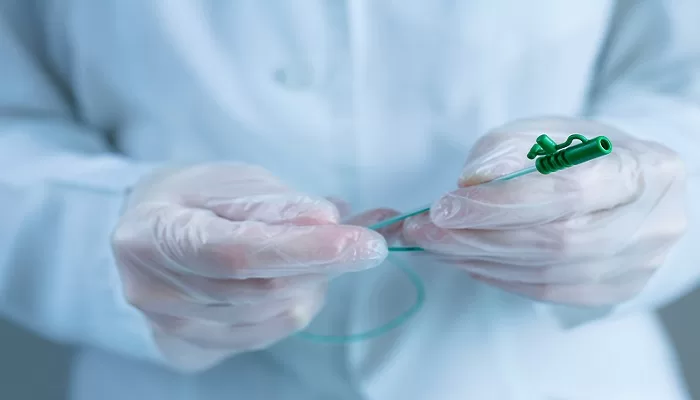Health
Newly Discovered Catheter Material Could Prevent Common Infections

Researchers at the University of Nottingham have discovered a new coating that could prevent bacterial infections typically caused by biofilms on catheters.
The new material – an acrylate copolymer and a first of its kind – is resistant to single and multi-species bacterial biofilm formation, swarming, encrustation and host protein deposition, which are all major challenges associated with preventing catheter-associated urinary tract infections (CAUTIs).
This research was led by Professors Morgan Alexander and Paul Williams and was co- first authored by Jean Dubern. Professor Derek Irvine of the Centre for Additive Manufacturing, Faculty of Engineering, developed the appropriate processing regime to generate the correct copolymers.
The research was a broad collaboration between the University of Nottingham’s National Biofilms Innovation Centre, School of Life Sciences; Advanced Materials and Healthcare Technologies, School of Pharmacy, Division of Gastrointestinal Surgery, Nottingham Digestive Diseases Centre NIHR Biomedical Research Unit and Nottingham University Hospitals NHS Trust.
Indwelling urinary tract catheters are the most commonly used prosthetic medical devices with some 15 to 25% of patients requiring bladder catheterization during hospitalization. However, they promote CAUTIs, which are responsible for some 75 to 80% of hospital-acquired urinary tract infections occurring annually worldwide.
In 2012, the researchers discovered a material that prevented bacterial biofilms being formed by Pseudomonas aeruginosa, Staphylococcus aureus and Escherichia coli. P. aeruginosa and S. aureus are problematic for device-associated infections generally, whilst E. coli commonly causes CAUTIs.
The new research builds on this previous work over a period of more than 10 years with tests against the bacterial pathogen Proteus mirabilis – specifically its ability to swarm and cause catheter encrustation – which is unique to CAUTIs.
Proteus mirabilis has a unique ability to swarm and form large bacterial ‘rafts’ on hard surfaces that cover large distances, for example, up the length of a catheter into the bladder. It is also responsible for driving biomineralization or encrustation, inside the catheter which results in blockages that can lead to serious kidney infections and septicaemia. Encrustation around the outside makes removal of catheters extremely painful for patients.
Andrew Hook, Assistant Professor, School of Pharmacy, said: “We always had this lingering question as to whether the material that we previously discovered prevented biofilm formation, could be modified to prevent swarming and biomineralization”.
“We have tested more than 450 acrylate polymers and discovered that by combining two different monomers we could create a new material that is all-encompassing and prevents multi-species biofilm formation, swarming and biomineralization. This is totally unique and currently the only biomaterial capable of preventing swarming that we are aware of.”
Paul Williams, Professor of Molecular Microbiology, Biodiscovery Institute and School of Life Sciences comments: “We were also delighted to confirm the clinical potential of our new copolymer, which resisted biofilm formation after exposure to urine from catheterized patients and was non-toxic in laboratory tests.
“This breakthrough should be great news for clinicians and patients when it comes to urinary tract catheterisation. hopeful that this could mark a step-change in the management of CAUTIs in the future and help to dramatically reduce the number of CAUTIs in patients in hospital and other healthcare settings.”
About The University of Nottingham
Ranked 18th in the UK by the QS World University Rankings 2023, University of Nottingham is a founding member of Russell Group of research-intensive universities. Studying at the University of Nottingham is a life-changing experience, and we pride ourselves on unlocking the potential of our students. We have a pioneering spirit, expressed in the vision of our founder Sir Jesse Boot, which has seen us lead the way in establishing campuses in China and Malaysia – part of a globally connected network of education, research and industrial engagement.
The University is among the best universities in the UK for the strength of our research, positioned seventh for research power in the UK according to REF 2021. The birthplace of discoveries such as MRI and ibuprofen, our innovations transform lives and tackle global problems such as sustainable food supplies, ending modern slavery, developing greener transport, and reducing reliance on fossil fuels.The University is a major employer and industry partner – locally and globally – and our graduates are the second most targeted by the UK’s top employers, according to The Graduate Market in 2022 report by High Fliers Research.
We lead the Universities for Nottingham initiative, in partnership with Nottingham Trent University, a pioneering collaboration between the city’s two world-class institutions to improve levels of prosperity, opportunity, sustainability, health and wellbeing for residents in the city and region we are proud to call home.
Source: The University of Nottingham




















































